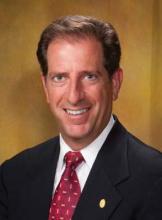After a survey found that 80% of 1,500 U.S. emergency physicians think the system for treating persons in acute mental health crisis is broken, emergency medicine professionals teamed up with mental health workers and patient advocates nationwide to call for a new model of care.
The Coalition on Psychiatric Emergencies, or COPE, is focused on improving the delivery of emergency psychiatric care, and is supported by more than 30 national emergency medicine, mental health, and patient advocate groups, including the American College of Emergency Physicians, the American Psychiatric Association, and the National Alliance on Mental Illness.
“It’s time we think about doing things differently,” Dr. Michael J. Gerardi, COPE Steering Committee Chair and immediate past president of ACEP, said in a statement. “Through this unique collaboration, the Coalition on Psychiatric Emergencies will focus on developing a more unified treatment model and improving the treatment experience for both patients and health care providers. We want to provide the best care for all our patients and reduce health care costs.”
Among its several goals, the coalition seeks to shorten the time between when a person in mental health crisis presents in the ED and is admitted to an inpatient psychiatric bed. In a recent NAMI survey of 1,400 families, 38% waited more than 7 hours in the ED before seeing a mental health professional. For 21% of those families, the wait was more than 10 hours.
COPE also seeks adequate education and training for all emergency personnel who care for patients experiencing psychiatric emergencies.
“Emergency department staff need proper training not only on how to handle behavioral health emergencies, but also on how to initiate care for patients who may remain in the ED setting for long periods of time,” Dr. Lorenzo Norris, director of inpatient psychiatric services at George Washington University Hospital, Washington, said in an interview. “Establishing these new systems will likely require robust funding efforts.
‘‘There is a growing need for change. At our hospital, we have definitely seen an uptick in the number of patients seeking emergency psychiatric care,” Dr. Norris said. “Our approach has been to hire a clinician whose sole duty is to work collaboratively with patients and ED staff. It’s the first step in our ultimate goal of creating an ED behavioral health team that includes a psychiatrist, an emergency physician, nursing staff, social worker, and others who can provide the patient with comprehensive care at the initial point of contact.”
Currently in the U.S., there are no standard protocols for a psychiatric emergency, according to the National Institute of Mental Health. The online survey was conducted within the ACEP membership between July 1-31, 2015. The response rate was 6% and the margin of error of 2.5 percent.
On Twitter @whitneymcknight



